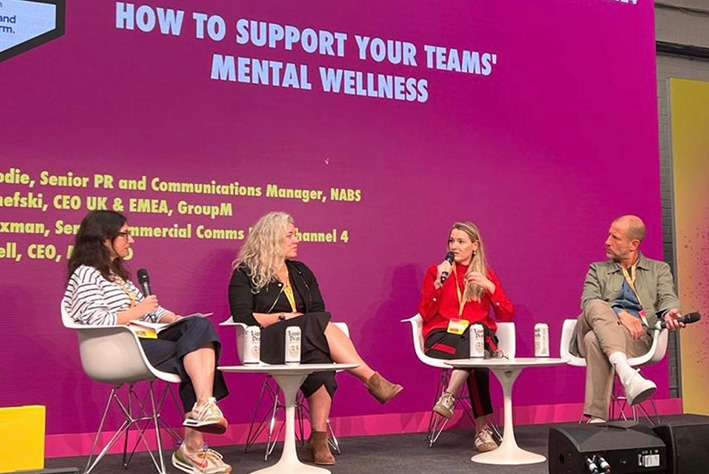Lessons in supporting your teams’ mental wellness

Opinion
Most people in the industry want to pay more attention to mental wellness, but many feel unable to talk about this issue in the workplace. How can leaders change this narrative?
How can you best support your teams’ mental wellness?
That’s the question three industry leaders discussed at Mad//Fest 2024 in a session hosted by Nabs, the charity supporting those in advertising, marketing and media.
Emma Flaxman (senior commercial comms lead at Channel 4), Natalie Bell (CEO at MG OMD and trustee of Nabs) and Josh Krichefski (EMEA and UK CEO at GroupM and IPA president) shared their insights to help people across the industry support their teams’ mental wellness.
It’s a crucial time for this discussion. According to Nabs’ All Ears community consultation, more than 70% of adlanders want our industry to give more attention to mental wellness, yet 35% of people feel unable to discuss their mental wellness at work.
Top issue
What’s the number one issue facing our industry that they think is driving challenges for people around being able to cope well?
Flaxman discussed the prevalence of burnout, outlining some of the key markers that people should watch out for in themselves and those around them. Her own marker is how her sleep is affected. She advised checking in with team members in a supportive way to find out how they’re doing.
Krichefski highlighted years of constant uncertainty and worry relating to the industry and the wider world. Economic and political volatility and global conflict are taking their toll, causing people considerable stress and worry.
Bell, meanwhile, focused on the pressures facing managers, with people often promoted into management positions without enough experience or training to handle the breadth of issues expected of them. She called on the industry to make structural change so managers’ roles are more realistic.
The People First promise
As IPA president, Krichefski created the People First promise, which asks the industry to demonstrate its commitment to people’s mental health. It provides a three-step framework to support mental wellness, enabling agencies to structure their actions and how to measure the results.
Krichefski described the importance of accountability and visible action when it comes to mental wellness at work and emphasised that the People First promise was created with expert advisors to ensure it is evidence-based, workable and focused on positive and realistic action.
Training for managers
Having worked in new business for an agency and now owner side at Channel 4, Flaxman shared the better work-life balance in her current role compared with her former agency life. Even seemingly simple tactics, such as encouraging everyone to step away from their desks at lunchtime, have a positive impact on mental wellness.
Bell emphasised the positive benefits of talking therapy, describing how therapy provider Self Space offers a service to MG OMD employees to help their mental wellness on an ongoing basis.
All Ears revealed that more than 40% of people who experience mental wellness challenges would talk to their line manager first about this. What should managers be doing to support mental health conversations at work?
Bell led with the need to bridge the gap for middle managers, who are squeezed between pressure from the top and managing their own teams. Over-promoting is another issue. Management should not be seen as the automatic promotion route; there must be alternative pathways to promotion if people don’t want to be managers.
As a whole, the panel agreed on the huge load faced by managers and the importance of fully training them. Managers need to understand how to support their own mental health while holding space for team members who need to discuss theirs, as well as how to signpost to further support. Mental health first aid training and Nabs’ management training were highlighted as two solutions.
Destigmatising discussions about mental wellness
The panel agreed that the more we discuss mental wellness, the more we can remove stigma.
Education is key, according to Krichefski, so that people can understand their own mental health and how it is part of their experience at work. Education will help people understand the difference between mental health issues and work being stressful, and this in turn will point towards how people can support themselves most appropriately.
The difference in approach to mental wellness between newer entrants and more senior leaders is also a challenge, as highlighted by Flaxman, with some younger workers taking days off for mental health when that is not the most appropriate solution. If they were able to discuss their mental wellness properly with their managers, they could get more effective support. Removing stigma and increasing understanding among more experienced adlanders is key to get these discussions going.
Bell stressed that the industry has yet to tackle addiction as a key issue, particularly in the case of alcohol, despite it affecting countless people within the industry. A different approach is needed — where addicts might currently be put under performance management, what they need is better support with their mental health.
Find out more about Nabs’ management training here.
 Louise Scodie is senior PR and communications manager at Nabs (credit: Bronac McNeill)
Louise Scodie is senior PR and communications manager at Nabs (credit: Bronac McNeill)





